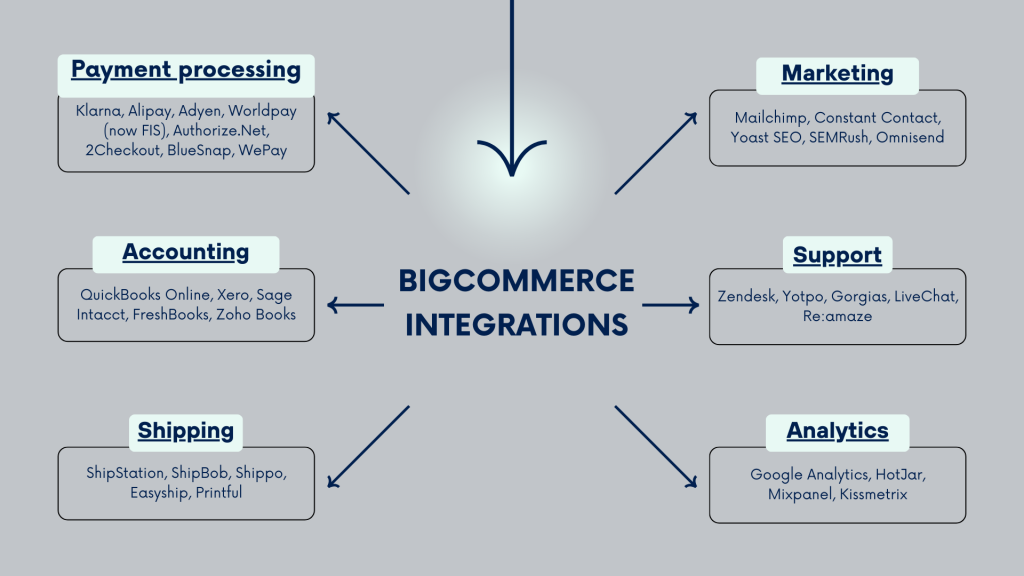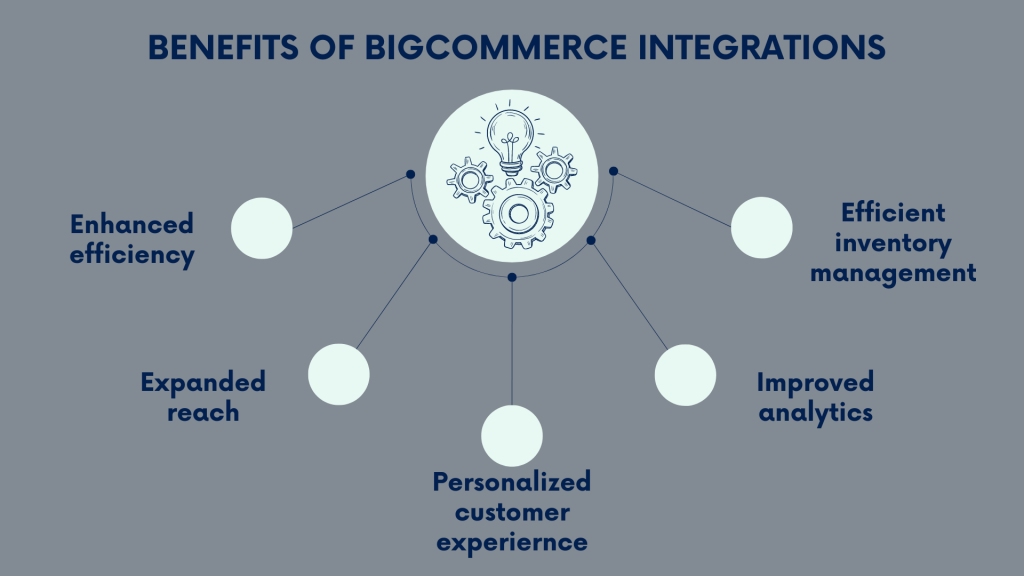Business owners seek to bring more efficiency to their operations and management (and who doesn’t?). Even using ecommerce platforms like BigCommerce, you might want to streamline whatever you have. At this point, integrating BigCommerce with various business tools and services seems logical.
Let’s look at how BigCommerce integrations help run and manage ecommerce business more efficiently.
Key takeaways
- BigCommerce integrations streamline operations, automating tasks like order management, inventory control, and financial reporting. By connecting with various tools and services, businesses can save time, reduce manual work, and focus more on growth initiatives.
- Integrating BigCommerce with marketplaces like Amazon or eBay allows businesses to reach a broader audience and increase sales opportunities without extensive effort. Expanded reach opens up new avenues for growth and diversification.
- CRM integrations enable businesses to personalize the shopping experience based on customer preferences and past interactions. You can leverage customer data to tailor product recommendations and marketing efforts, fostering customer loyalty and increasing sales.
What is BigCommerce integration?
Without much further ado, BigCommerce integration refers to connecting the BigCommerce platform with other software or systems to enhance functionality and operations within an ecommerce business.
BigCommerce is an ecommerce platform that allows businesses to create and manage online stores with customized storefronts, efficient inventory management, and effective marketing tools for boosting sales. It’s designed to accommodate businesses of all sizes, providing an accessible solution for establishing and growing their online presence.
Technically, integration means setting up communication between BigCommerce and other platforms or tools through APIs (Application Programming Interfaces). APIs allow different software systems to exchange data and interact with each other seamlessly.
For example, integrating BigCommerce with accounting software enables automatic synchronization of sales data, inventory levels, and financial transactions between the two systems, eliminating the need for manual data entry and reducing errors.
Businesses might opt for BigCommerce integration to improve efficiency, save time, and enhance productivity.
Integrating BigCommerce with accounting software, payment gateways, shipping carriers, and customer relationship management (CRM) systems, can streamline processes, automate tasks, and gain better insights into their ecommerce operations. This integration empowers businesses to focus more on growth and customer satisfaction rather than getting bogged down by manual administrative tasks.
Does BigCommerce have plugins?
If we speak about traditional native plugins, there are not so many (I can recall just one, being the BigCommerce for WordPress plugin, which we’ll get to a bit further on). However, the platform provides many built-in features and functionalities, allowing one to set up and manage various aspects of an ecommerce business.
Let’s look at those real quick.
BigCommerce business management tools
So, as mentioned, BigCommerce in-built tools for business management are quite versatile and include almost everything you might think of, from payment processing to marketing to analytics.
- Payment gateways
BigCommerce supports multiple payment gateways, including PayPal, Stripe, Square, and others, allowing merchants to process online payments securely and providing customers with flexibility in payment forms and methods.
- Shipping options
As a merchant, you can set up various shipping methods, including real-time carrier rates, flat-rate shipping, and free shipping thresholds, to offer your customers a choice of shipping options.
- Marketing tools
BigCommerce offers built-in marketing tools, allowing you to better engage with your customers, encouraging more sales. These include abandoned cart recovery, discount codes, email marketing integrations, and more.
- Product management
The platform possesses tools for managing product catalogs, including options for variants, SKUs, inventory tracking, and bulk product editing.
- SEO and analytics
BigCommerce includes features for optimizing store content for search engines (SEO) and tracking store performance through built-in analytics and reporting tools.
As you can see, the toolset is pretty extensive. However, the platform does offer an app marketplace where users can find and install third-party apps and integrations to expand the platform’s functionality further. We’ll look at those in detail in a minute.
I need this minute to tackle the WordPress plugin I promised you.
Does BigCommerce integrate with WordPress – a look at the BigCommerce for WordPress plugin
BigCommerce offers a native ecommerce plugin for WordPress. It allows you to integrate an ecommerce store into your website (built on WordPress, obviously).
For example, you’re a hair and nail salon having your website to present your business to customers, let them know about your services, and book their appointments online. Let’s say you’re selling professional hair and skin products on-site and, eventually, want to sell them through your website as well (as you see the demand or for whatever other reason).
So, BigCommerce for WordPress can help you at this point.
It integrates BigCommerce’s ecommerce tools into a WordPress website, enhancing the online selling potential of a WordPress site and allowing you to manage BigCommerce store operations directly from the WordPress dashboard. You have product management, secure payments, shipping options, and marketing tools – everything to create a unified shopping experience for customers.
So, if you’re using both, I mean BigCommerce and WordPress, it might be the right thing for you to manage various aspects of your business in one place.
A sneak peek into BigCommerce’s app marketplace: what integrations you can find there
As mentioned, BigCommerce has an extensive app store of third-party apps and integrations one can choose from. These apps and services enable a business to give users more features and options and improve or facilitate some operations and management processes for the said business. They fall into several categories, covering various aspects of handling business matters so one can build their business infrastructure around BigCommerce.
We’ll look at some main areas where these apps help, along with some examples.

#1 – Apps to help you recieve and process payments
As you know, BigCommerce possesses built-in integration with the most popular payment processing services, including Stripe, PayPal, and Square. However, you might want to add more options here to comprise, for example, more of international or alternative payment methods. So, you might consider looking through this category.
Here’s how can payment gateway integration work for your online store.
Integrating additional payment gateways with BigCommerce allows you to offer your customers a wider range of payment methods. Why would you need this? The quick answer is people are more likely to buy (and not go away at the checkout) if they have a familiar payment option or the one catering the most to their needs (like a buy now pay later or installment payment option). Simple, so far, but let’s break it down.
Enhancing customer experience
Integrating diverse payment gateways and processing systems allows you, as mentioned, to provide flexibility and convenience to your customers, allowing them to choose their preferred payment method at checkout. It improves the overall shopping experience and reduces cart abandonment rates, as customers are more likely to complete their purchases when presented with trusted payment options (that’s what I said).
Optimizing for international sales
For ecommerce businesses targeting international markets, integrating payment gateways that support multi-currency transactions is crucial. People might want to purchase in their local currency without confusion over exchange rates, and you might want to give them the possibility. Payment gateways tailored for international payments can handle multi-currency transactions, track exchange rates, and offer features like fraud protection and compliance with local regulations (taking care of taxes, for example), further enhancing the international sales process.
You might want to consider the following options: Klarna, Alipay, Adyen, Worldpay (now FIS), Authorize.Net, 2Checkout, BlueSnap, WePay, and more.
Apps to help you with accounting and finance management
BigCommerce also integrates with accounting and finance management software, helping you automate your financial processes and ensure accurate reporting. You can synchronize sales data and financial transactions, reduce manual tasks, and minimize errors. You might benefit from real-time insights into revenue, expenses, and profit margins, make better financial decisions, understand your cash flow, and more.
Automated data syncing
The integration synchronizes sales data and financial transactions between your BigCommerce store and accounting software. This automation eliminates the need for manual data entry, saving you time and reducing the risk of errors that can occur with manual input.
Reduced manual tasks
With sales data and financial transactions automatically synced, you can reduce manual tasks associated with reconciling sales, managing invoices, and recording expenses. This way, you can free up more time to focus on other aspects of your business, such as customer service or marketing.
Minimized errors
The integration helps minimize errors that can occur due to manual data entry. Automated data synchronization ensures the accuracy of your financial records, which is crucial for future financial analysis, reporting, and compliance with accounting standards.
Real-time insights
Real-time sales data and financial transaction synchronization give you access to up-to-date insights into your revenue, expenses, and profit margins. So you can track your financial performance more effectively and make timely adjustments to your business strategy as needed to maximize profitability.
Understanding cash flow
The integration provides visibility into your cash flow, allowing you to track incoming revenue and outgoing expenses more effectively and manage your finances more proactively to ensure you have sufficient funds to cover spending and investments.
Popular options here include Synder, QuickBooks Online and Xero (there’re are more, of course, but these two are, like, leaders).
Synder can integrate your BigCommerce store with accounting (be it QuickBooks or Xero, whichever you’re using) and, on the other end, with all your sales channels, like payment processing platforms and ecommerce marketplaces, creating a smoothly working finance management ecosystem. Book your seat at our Weekly Public Demo to see how you can do it with Synder, or explore it yourself with a 15-day all-inclusive free trial.
Apps to help you provide shipping and delivery
Integrations in the shipping and order delivery category can help businesses efficiently manage the shipping process and ensure the timely delivery of orders to customers. You can automate various aspects of shipping, such as order processing, label generation, and tracking updates, improving operations and reducing manual tasks.
Here’s what you get with shipping integrations.
Automated order processing
These integrations automate various aspects of the shipping process, starting from order fulfillment to label generation. When someone orders a product on your BigCommerce store, the integration automatically triggers the fulfillment process, saving you time and effort spent on manual order processing.
Efficient label generation
With shipping integrations, you can generate shipping labels directly from your BigCommerce dashboard. There’s no more need for manual label creation, and you have accurate shipping information, reducing the risk of errors that can lead to delayed shipments or delivery issues.
Real-time tracking updates
Once orders are shipped, these integrations provide real-time tracking updates to you and your customers. This transparency in the shipping process allows customers to track their orders from shipment to delivery, reducing inquiries and providing peace of mind about the status of their purchases.
Flexible shipping options
Shipping integrations offer various shipping options and carriers one can choose from, allowing you to select the best shipping method based on cost, delivery speed, and customer preferences. This flexibility ensures that you can meet the diverse shipping needs of your customers while optimizing shipping costs for your business.
You might consider, for example, ShipStation or ShipBob integrations for BigCommerce.
Apps to help you with marketing and promotion
BigCommerce provides connections with marketing and SEO tools to assist businesses in attracting visitors to their online stores and increasing their online visibility. These tools offer various features to help promote products and improve a website’s ranking in search engine results.
Attracting visitors
Marketing integrations enable you to attract visitors to your online store through various channels, such as email marketing, social media promotions, and digital advertising campaigns. These tools help you reach a broader audience and drive targeted traffic to your website, increasing the chances of converting visitors into customers.
Increasing online visibility
SEO tools focus on improving your website’s visibility in search engine results pages (SERPs) by optimizing various aspects of your site, including content, metadata, and site structure. These integrations provide insights and recommendations to help you enhance your website’s SEO performance, making it more discoverable to potential customers searching for products or services related to your business.
Promoting products
Marketing integrations usually offer features to help you promote your products effectively, such as creating promotional campaigns, discounts, and special offers. You can target specific customer segments, showcase new products, and drive sales by enticing customers with compelling promotions and incentives.
Optimizing website content
SEO integrations provide tools and resources to optimize your website content for search engines, including keyword research, on-page optimization, and content creation strategies to improve your website’s relevance and authority in search engine algorithms. By optimizing your website content, you can increase organic traffic and improve your site’s visibility in search results.
Analyzing performance
Both marketing and SEO integrations offer analytics and reporting features to track the performance of your marketing campaigns and SEO efforts. These tools provide valuable insights into key metrics such as website traffic, conversion rates, and keyword rankings, allowing you to measure the effectiveness of your marketing strategies and make data-driven decisions to optimize performance.
You might want to look at Mailchimp, Constant Contact, Yoast SEO, or SEMRush here.
Apps to help you support and interact with customers
While BigCommerce offers built-in customer service and engagement features, businesses may still benefit from considering third-party integrations for several reasons. These integrations often provide more advanced functionalities and specialized tools tailored to specific needs, allowing businesses to customize their customer service and engagement strategies further.
Access to advanced functionalities
Third-party integrations often provide more advanced functionalities and specialized tools tailored to customer service and engagement needs – for example, advanced live chat capabilities, AI-powered chatbots, or sophisticated email marketing automation tools. You can incorporate these solutions into your BigCommerce platform to enhance customer service capabilities and engage with customers more effectively.
Customized strategies
Third-party integrations allow businesses to customize their customer service and engagement strategies further, offering flexibility in choosing the tools and features that best align with the business’s unique goals and requirements. Whether it’s personalized email campaigns, targeted social media interactions, or advanced CRM capabilities, you can tailor your approach to meet the specific needs of your audience and drive meaningful engagement.
Centralized operations
Many businesses might already use multiple customer service, marketing, and engagement solutions. Integrating them with BigCommerce helps centralize a business’s operations and improve efficiency. Instead of managing separate platforms and systems, you can consolidate customer data, communication channels, and engagement tools within the BigCommerce environment. This way, you simplify workflows, reduce administrative overhead, and ensure a seamless experience for both customers and staff.
Enhanced scalability
As businesses grow and expand, their customer service and engagement needs evolve. Third-party integrations offer scalability, allowing you to scale operations without outgrowing your existing tools. Whether handling increased customer inquiries, managing extended email subscriber lists, or supporting higher website traffic, these integrations can adapt to accommodate growing demands and ensure continued efficiency and effectiveness.
Improved customer experience
Besides all the above, integrating third-party customer service and engagement solutions with BigCommerce helps improve overall customer experience. You can use advanced functionalities and tailored strategies to provide better support, personalized interactions, and relevant content to your customers. Thus, you can build stronger relationships, increase customer satisfaction, and drive loyalty and repeat business.
In this category, you might want to look at Zendesk or Youtpo.
Integrations to help you analyze sales and data
Data is probably your business’s biggest asset. And you might want to approach it right, extracting valuable insights into customer behavior, sales trends, and overall business performance. Analytic tools allow you to dig into your numbers to figure out your product performance, customer behavior trends, sales across various channels, and many more.
Here’s how this integration can work for a business.
Understanding customer behavior
Analytics tools allow businesses to dig deeper into their data and understand customer behavior in detail. You can analyze metrics such as website traffic, page views, and conversion rates, telling how customers interact with your online store. This understanding gives you plenty of food for thought on optimizing your website design, marketing strategies, and product offerings to meet customer needs and preferences.
Analyzing sales trends
With analytics integration, businesses can track sales trends over time and identify patterns and fluctuations in their revenue streams. The sales data analysis by product, category, or period allows you to identify top-performing products, seasonal trends, and growth opportunities. This insight enables you to adjust inventory management, pricing strategies, and marketing campaigns to maximize sales and profitability.
Measuring marketing effectiveness
Analytics tools enable businesses to measure the effectiveness of their marketing efforts across various channels. Track click-through rates, conversion rates, and return on investment (ROI) to assess the performance of your marketing campaigns and channels. This information helps businesses allocate marketing budgets more effectively, focusing on channels that drive the highest return on investment.
Informing strategic decision-making
Analytics tools provide an easily digestible view of business data to identify areas where you can improve operations and performance, be it optimizing website performance, refining product offerings, or enhancing the customer experience. Integrating BigCommerce with analytics tools helps you make data-driven decisions based on actionable insights instead of making assumptions, providing the foundation for sustainable business growth.
Here, you might consider looking at Google Analytics, HotJar, Mixpanel, Kissmetrix, and more.
How do BigCommerce integrations benefit ecommerce businesses?
Now, let’s sum up the benefits of BigCommerce integrations, shall we? We’ve touched upon them briefly, but let’s get them together to have a full picture (and see how it works in real-life examples).

Benefit #1 – Enhanced overall efficiency
Integrating BigCommerce with other tools makes running your online store smoother. Tasks like managing orders, inventory, and finances get automated, so you spend less time on paperwork and more time growing your business.
Imagine you’re running an online clothing store, and you’re swamped with orders every day. By integrating BigCommerce with your accounting software, instead of spending hours manually entering sales data, you can focus on selecting new inventory or improving customer service.
Benefit #2 – Expanded reach and sales channels
With BigCommerce integrations, you can sell your products in more places than just your website. Connecting to marketplaces like Amazon or eBay can help you reach more customers and increase your sales opportunities without much extra effort.
Let’s say you’re a small artisanal business crafting and selling knitted woolen hats, scarves, and mittens. You can integrate your BigCommerce store with Amazon or Etsy and showcase your products to an audience beyond your local community. Expanding reach often means more work on managing all these additional platforms. Marketplace integration, in this case, takes this work upon itself, leaving you more time for your core task of knitting, trying out new designs, learnign customer preferences, and, actually, growing your business.
#3 – Personalized customer experience
Integrating BigCommerce with CRM systems helps you understand your customers better. You can use their past purchases and preferences to personalize their shopping experience, making them feel valued and thus increasing the probability of them buying more from you.
So, a shopper is looking for a new pair of running shoes on your web store. Thanks to BigCommerce integrations with CRM systems, your website remembers all the items this shopper bought from you in the past and, based on that knowledge, suggests complementary products like running socks or hydration belts, or water-proof sports wear, making their shopping experience more convenient and personalized (and increasing the likelyhood of more sales for you).
Benefit #4 – Improved analytics and reporting
As mentioned, integrations with analytics tools give you valuable insights into your business performance. You can track multiple business performance metrics like website traffic, sales trends, inventory turnover, and plenty of stuff, helping you understand your business’s bottlenecks and working strategies and decide how to grow it.
Suppose you’re managing an online electronics store. You integrate BigCommerce with Google Analytics to track which products are the most popular among your customers, which products have seasonal peaks in sales, which marketing campaigns drive the most traffic to your website, and more. Geared with this data, you can adjust your inventory and marketing strategies accordingly to boost sales.
Benefit #5 – Efficient inventory management
Integrating BigCommerce with inventory management systems helps you control your stock levels across all sales channels. It helps prevent stockouts and overstocking, ensuring you have products available when customers want them.
Running an online store (a handmade jewelry boutique, if you will), poor inventory control can cause lots of trouble. You might miss the moment when one of your products goes out of stock but still shows as available, for example. It’s the point where you’re losing your customers for good. So, you might want to keep track of your inventory and be aware of products running low or out of stock. This way, you can change their status on time, avoid out-of-stock situations, replenish these items, and keep the cash flowing continuously.
You can integrate BigCommerce with an inventory management tool to ensure you never run out of your bestselling pieces. With this integration, when a necklace or any other product sells out, your inventory levels will be automatically updated across all platforms, preventing disappointed customers and missed sales opportunities. These tools can tell you when to order more products running low and more of the good stuff about your products. You get the idea.
Wrapping it up
Definitely, all the above is just a quick overview, and there are much more integration types and apps available, each coming with benefits (and some drawbacks, of course, but you can’t geit it all, can you?). The general idea is that these integrations make it easier for businesses to run their online stores efficiently and provide a better experience for their customers.
It’s great that BigCommerce can integrate with so many various tools, so a business can choose options that batter cater to their needs, balancing those pros and cons and building a smoothly working management system around their BigCommerce website.
Learn more about BigCommerce vs Shopify.
Share your thoughts
Can you see more benefits of BigCommerce integrations? Please share your thoughts in the comments section below. We’d love a good discussion!






